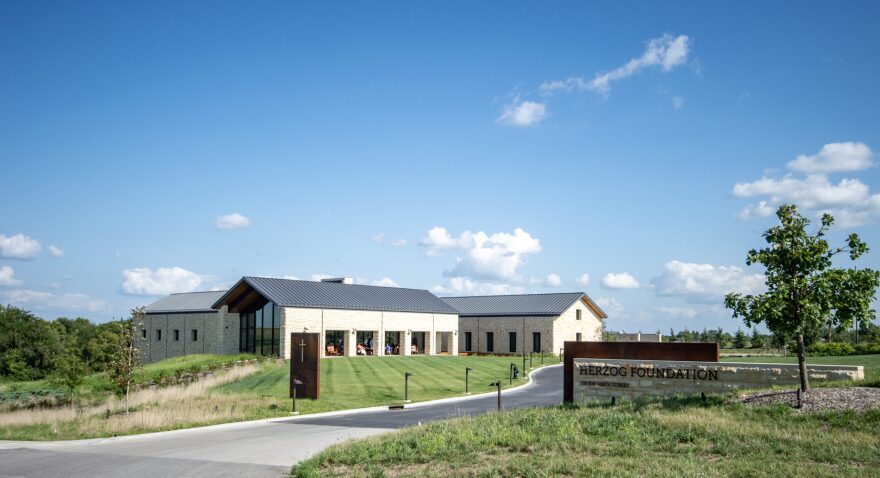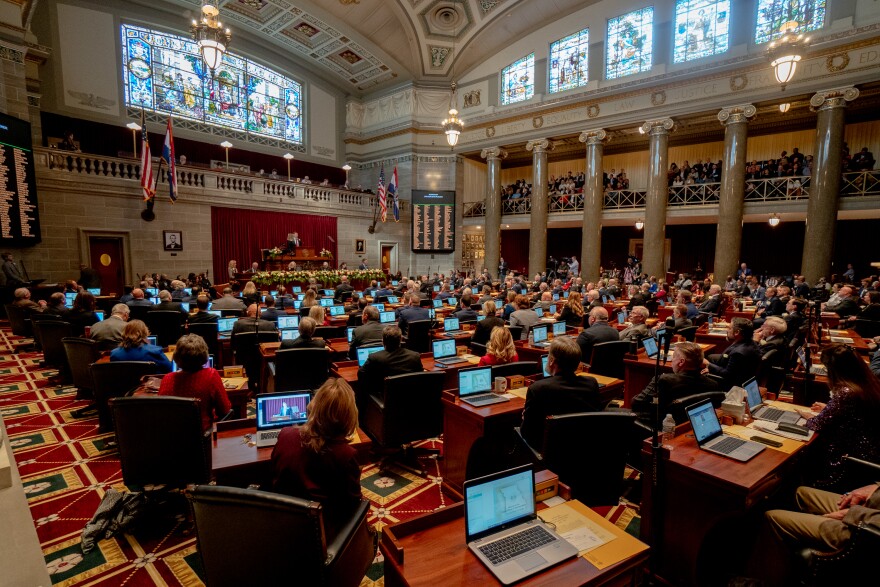When students returned to classrooms around Missouri in August, only 601 had secured a scholarship through the MOScholars program as a returning recipient — half as many as were in the program in May.
There were also 247 first-time participants.
Three months into the school year, MOScholars has ballooned to 829 returning students and 675 new students. Lawmakers and the Missouri Treasurer’s Office participation in the program, which is designed to use tax credits to provide scholarships for families to pay costs to attend private schools, will continue to climb until the end of January when the funding cycle is complete.
Even though demand for the scholarships is understandably highest just before the school year begins, the way the program was built by lawmakers means funding often doesn’t show up until the end of the calendar year — leaving families scrambling and private organizations trying to offset costs in the fall.
The program’s biggest proponents acknowledge a fix is needed. But even incremental changes to education policy are met with skepticism in the Missouri legislature, which barely passed MOScholars in the first place in 2021. Compounding that challenge is the goal of school-choice advocates to expand student eligibility, even as current participants and the organizations administering scholarships struggle to navigate structural issues.
“We have thousands of kids, students and families that want to participate in this program, and the resources aren’t out there through the tax credit program,” Jean Evans, Missouri state lead for the American Federation for Children, a large proponent of state funding for K-12 scholarships.

Funding
MOScholar’s K-12 scholarships are funded by donations that come with a 100% tax credit for the donor. The tax credits donors claim come out of the state’s general fund.
Six educational assistance organizations, overseen by the State Treasurer’s Office, apply for tax credits each year. Individuals and companies can donate up to half of their state taxes to the organizations and receive a tax credit.
Funding for the program follows the tax year, with many taxpayers squeezing in donations before the Dec. 31 deadline and educational assistance organizations using those funds in January.
“They are raising money and deploying it at the same time,” Evans said. “They really need enough money there so that they’re raising money for the next year.”
She said some programs wait until they have enough money to fund the rest of a student’s K-12 education before awarding a scholarship.
But Missouri’s program, passed in the 2021 legislative session, was implemented in the fall of 2022 — a quick start with little promotion other than word of mouth.
Ashlie Hand, director of communications for Bright Futures Fund, the state’s largest EAO, said the timeline of the tax credits is a barrier for some families.
The donation must be made by December 31, so the taxpayer will be out of that money until it’s time to file taxes and the credit is realized. It might be keeping some individuals from cashing in a check to the EAOs.
Some have hope that the current situation will dissipate as the tax-credit process is demystified and corporations donate to the program for a tax credit.
“The treasurer’s office has taken a vested interest in trying to promote the program,” David Masterson, MOScholars program supervisor, told The Independent. “Treasurer [Vivek] Malek actually recorded a PSA trying to raise awareness about the tax credit portion to increase donations in addition to the efforts that the EAOs are currently doing to raise those funds.”
All six EAOs have a preference for religious schools, and their strong connection to Catholic schools and parishes has landed MOScholars and tabs on school webpages.

Herzog Tomorrow Foundation, , has a podcast that advocates for parents to “” to private Christian education. It also discusses the tax-credit donation process.
“A lot of taxpayers would be very interested in contributing, they just don’t necessarily know how,” state Rep. Phil Christofanelli, a Republican from St. Peters running for Missouri Senate, told The Independent.
Christofanelli sponsored the bill that created the MOScholars program.
“It costs you nothing to contribute your state income tax liability to a child in need that wants to attend a school of their choice, and a lot of parents and donors are interested in that,” he said. “We just need to get the message out about how to do it and make it as seamless for them as possible.”
Beyond advertising the program, educational assistance organizations have been using their own funds to help students obtain a MOScholars scholarship in the fall.
This year, educational assistance organizations have begun using their private funds to cover student scholarships at the beginning of the school year and pay themselves back. It allowed some EAOs to welcome more students back at the start of the school year with their full scholarship amount.
The Treasurer’s office thought only Bright Futures Fund was doing this. But, , Today and Tomorrow Educational Foundation has said it uses its funds to front expenses.
The Today and Tomorrow Educational Foundation also has a private scholarship program separate from MOScholars.
But not all EAOs are prefunding scholarships, leaving some students without the promised funding in the fall.
The scholarship automatically renews if the parent or student requests, but it can’t be awarded until the funds are secured. Evans said some schools are being gracious to the MOScholars students trapped between renewal and receiving funds.
“Some of the schools are letting the kids enroll and waiting for the money to come in,” she said. “Other schools are asking them to pay what they can until the money comes in, and then extra is refunded.”
Some organizations are also waiving the administrative fees that they are allowed to take from donations. By state statute, EAOs can take 10% of the first $250,000 raised, 8% of the next $500,000 and 3% thereafter.
“Several of the CEOs took less than the maximum administrative takedown,” Masterson said. “They took less from the program to try to get this program off the ground and get these kids in schools.”
Chris Vas, senior director at the Herzog Foundation, that the foundation donated $800,000 back to the program in administrative fees after the first year.
As of early November, the Herzog Tomorrow Foundation has renewed 186 scholarships, compared to last year’s 598 total scholarships. The organization has added no new students to the program.
There could be more students in classrooms awaiting funding to be processed by foundation.
Almost $5.9 million in donations have been given to the educational assistance organizations this year. In total, the organizations requested $18 million in tax credits for 2023.

Legislation
The program, cash-strapped and worn thin by an incompatible funding cycle, is seen as a beacon of opportunity for some lawmakers who speak about expanding it despite controversy in the Missouri General Assembly surrounding the policy.
Sen. Lauren Arthur, a Kansas City Democrat, told The Independent she was involved in the 2021 negotiations surrounding . There were two versions of the legislation — a more thoroughly vetted copy and the one some leaders thought could pass.
“This less well-vetted bill got through, and it was mostly because there were a handful of people in leadership positions that saw this as a priority” she said. "They used all of their tools and their muscle to get through the version that they thought stood the best chance of passing.”
Christofanelli proposed in the 2023 legislative session to raise the scholarship amount for students with an individualized education plan, a document that outlines services to help disabled students’ learning.
His bill passed out of committee but was not debated in the House, and he has even bigger ideas in mind.
“If you look across the country, states like Iowa that surround us, Arkansas and others have been pushing towards universal school choice programs where all kids are eligible, all kids can participate if they want to,” he said. “That’s the direction I’d really like to see Missouri go.”
Currently, the MOScholars program is open to students whose families meet certain low-income thresholds and students with an individualized education plan (IEP). Just under a third of scholarship recipients are students with IEPs, according to data from the treasurer’s office.
Bills proposing to expand the number of students eligible for the scholarship do not make it far in the legislative process.
Sen. Andrew Koenig, who is running for State Treasurer in 2024, filed a bill last session to strike the income requirements and allow families of any income level to access the scholarship. It passed out of the Senate Education and Workforce Development Committee, which Koenig chairs, but didn’t come up for debate in the Senate.
State Rep. Josh Hurlbert, who works for the Herzog Tomorrow Foundation as a scholarship coordinator, filed six bills proposing modifications to the program. One would have scrapped the existing educational assistance organizations and tax-credit model for a state appropriation overseen by a board.
His bills never gained any traction, and Hurlbert declined a request for comment.
Some, like Evans and other advocates, see a solution in adding a state appropriation to the program. Other states have taken this approach.
Arthur said a state appropriation was not part of 2021 negotiations.
“(Proponents) understood that any attempt to try and divert public dollars directly to these institutions would be met with a lot of criticism and opposition,” she said. “We all ultimately understood these are really just like vouchers that are being disguised as scholarships and that it would ultimately hurt our public schools. But this was a way that they argued that we could go around having to directly appropriate for this kind of program.”

Arthur voted against the bill’s passage in the Senate’s final vote.
Malek has not made a public statement on a change to the funding mechanism, such as adding a state appropriation, but is a proponent for opening the program to all of Missouri’s towns. MOScholars is currently limited to Missouri’s most populous areas.
He recommended the legislature expand the geographic regions and allow professional examinations of disability to qualify as an IEP in a .
“I think all Missouri kids and their families should be able to consider the MoScholars option, whether they live in Ladue or in Laddonia, or in St. Louis City or in Sikeston,” he wrote.
Evans said she’s heard people in rural parts of the state desire to be included in the program.
Arthur said the bill may not have passed in 2021 had it covered the whole state.
“There were people who opposed the idea because they didn’t want it for their communities. But as soon as their communities were carved out, they were willing to vote for it,” she said.
Arthur is skeptical any efforts to expand MOScholars will get traction, since these types of education bills must balance priorities of both school-choice and public-school advocates to stand any chance at all.
“Most of the legislation dies under its own weight because there are too many things attached to it,” she said.
Instead, Arthur would like to see the legislature analyze the effectiveness of the MOScholars program and look at transparency measures.
“There has to be a bigger conversation about the program and is it working? Or is it money that’s being given to private religious schools for students who were already attending those schools?” she said. “It’s worth going back and evaluating it from a policy standpoint.”
Changes to the program’s method of funding would have to come through the legislature. Otherwise, the Treasurer’s office controls when the funds are released.
This story was originally published by the , part of the States Newsroom.






